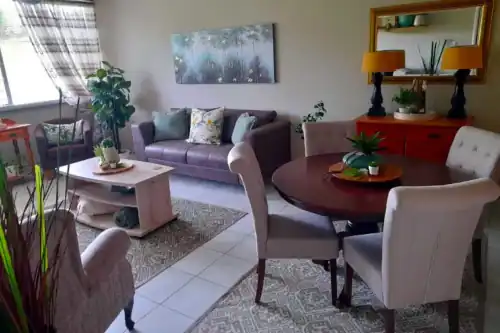Pets and Retirement offer a chance to build a joyful bond after leaving the daily grind behind.
Retirement marks a significant life transition—a time to relax, pursue hobbies, and enjoy newfound freedom. For many, this phase also brings the opportunity to welcome a pet into their lives. Pets and retirement often go hand in hand, as pets offer companionship, purpose, and joy. However, they also come with responsibilities that require careful thought. In this guide, we’ll explore the pros and cons of pet ownership during retirement, examine which pets are best suited for different living arrangements—flats, cottages, and retirement homes—and provide insights to help retirees make an informed decision about pets and retirement.
Other blog posts you may be interested in:
- Downsizing and Moving: Practical Tips and Debunking Myths for a Smooth Transition to Retirement Accommodation
- How to Cultivate a Life of Inspired Living in Retirement

The Pros of Pet Ownership in Retirement
Pets can profoundly enhance the retirement experience. One of the most significant benefits is companionship. As social circles may shrink due to relocation, the loss of colleagues, or changing family dynamics, a pet can fill the emotional void. Dogs, cats, and even smaller animals like birds provide a constant presence, reducing feelings of loneliness—a common challenge for retirees. Pets and retirement are often linked because pets bring comfort and stability to what can sometimes be an uncertain phase of life.
Beyond companionship, pets contribute to physical and mental well-being. Studies consistently show that pet owners experience lower stress levels, reduced blood pressure, and improved mood. For example, walking a dog encourages regular exercise, which is crucial for maintaining mobility and cardiovascular health in later years. Even less active pets, like cats, can lower anxiety through their calming presence. The routine of feeding, grooming, and caring for a pet also instills a sense of purpose, which can be especially valuable when the structure of a workweek disappears. Pets and retirement create a synergy that supports both emotional and physical health.
Socially, pets act as natural icebreakers. A retiree walking their dog in the park is more likely to strike up conversations with neighbors or fellow pet owners, fostering community connections. Finally, for those with grandchildren or younger relatives, pets can strengthen intergenerational bonds, offering shared activities and responsibilities during visits. Pets and retirement together can enrich family relationships and create lasting memories.
The Cons of Pet Ownership in Retirement
While the benefits are compelling, pet ownership in retirement isn’t without challenges. One major consideration is the financial cost. Veterinary care, food, grooming, and supplies can strain a fixed retirement income. Emergency medical expenses, in particular, can be unpredictable and substantial—think of a surgery costing hundreds or even thousands of dollars. Balancing pets and retirement financially requires thorough planning.
Physical demands are another hurdle. Active pets like dogs require regular walks, playtime, and attention, which may become difficult if mobility or energy levels decline with age. Even low-maintenance pets need consistent care, and retirees must assess whether they can meet these needs long-term, especially as the pet’s lifespan may extend a decade or more. Time commitment is also a factor. Boarding, pet sitters, or arranging care with family adds expense and planning. Additionally, some retirees may face emotional strain when considering their pet’s future. If a pet outlives its owner, who will take responsibility? This concern often prompts retirees to draft pet care plans or discuss arrangements with loved ones.
Lastly, living arrangements may impose restrictions. Retirement homes, in particular, often have strict pet policies, while flats and cottages may limit space or breed options. These constraints require careful planning, which we’ll explore next.
Pets for Different Living Situations
The suitability of a pet depends heavily on where you live in retirement. Let’s break it down by common living arrangements: flats, cottages, and retirement homes.
Pets for Flats
Flats, with their limited space and lack of private outdoor areas, call for pets that thrive in smaller environments. Cats are an excellent choice—they’re independent, require minimal space, and don’t need outdoor access (though a window perch is a bonus). Breeds like the Persian or Ragdoll, known for their calm demeanor, suit retirees seeking a low-energy companion. Small dog breeds, such as Chihuahuas, Shih Tzus, or French Bulldogs, can also adapt to flat life. These dogs need short walks rather than expansive exercise, making them manageable for retirees with moderate activity levels.
For those wanting minimal upkeep, fish or small birds like budgies offer companionship without demanding much space or physical effort. A small aquarium or birdcage fits neatly into a flat, providing visual interest and a soothing ambiance. When considering pets and retirement in flats, it’s essential to prioritize space-efficient options.
Pets for Cottages
Cottages, often surrounded by gardens or rural settings, open up more possibilities. Medium to large dog breeds—like Golden Retrievers, Labradors, or Collies—thrive here, especially if you enjoy outdoor activities. These dogs benefit from yards for play and exploration, aligning well with retirees who want an active lifestyle. However, their energy levels mean a commitment to daily exercise, so physical capability is key.
Cats also flourish in cottages, particularly if they can roam outdoors. Breeds like the Maine Coon or domestic shorthairs enjoy hunting and lounging in gardens, though indoor-only cats remain an option for safety. Small livestock, such as chickens, might appeal to retirees in rural cottages. Chickens provide eggs, pest control, and a hobby-like routine, though they require coops and protection from predators. Rabbits or guinea pigs are another cottage-friendly choice. They can live in hutches outdoors (with proper shelter) or indoors, offering cuddly companionship without the intensity of a dog.
Pets for Retirement Homes
Retirement homes vary widely in pet policies, so checking regulations is essential. Many allow small pets, with cats and small dogs (e.g., Pomeranians or Malteses) being common approvals. These animals fit compact living quarters and require manageable care, though staff assistance isn’t typically provided for pet-related tasks.
Birds, such as canaries or finches, are often permitted due to their small size and low mess. Their songs brighten a room, and their care—feeding and cage cleaning—is straightforward. Fish are similarly popular, requiring only a tank and basic maintenance, making them ideal for retirees with limited mobility.
Modern Living Flats

Basic Cottages

Modern Comfort Cottages

Comfortable Frail Care

Additional Considerations for Retirees
Beyond pros, cons, and housing, a few more factors merit attention. Age and health play a pivotal role. A high-energy puppy might overwhelm a retiree in their 80s, while a senior pet (adoptable from shelters) could be a better match, with lower activity needs and a shorter lifespan aligning with long-term planning.
Conclusion: Finding the Right Fit
Pet ownership in retirement is a deeply personal choice, balancing rewards like companionship and health benefits against challenges like cost and physical demands. Your living situation—whether a flat, cottage, or retirement home—narrows the options, but there’s a pet for nearly every scenario. Cats and small dogs suit compact spaces, larger breeds and livestock thrive in cottages, and birds or fish adapt to restrictive retirement homes. A pet can enrich your golden years, offering love and purpose—so long as it’s the right match for you. Could a furry, feathered, or finned friend join your journey with pets and retirement?
Thank you for your continued support, we appreciate your likes, follows and retweets on Facebook, Twitter, Pinterest and LinkedIn. Make sure to share this post with friends and family.
You can make a difference
With your assistance, the volunteers at La Gratitude will be able to take better care of not only the residents at the old age home but also the greater Newcastle community. La Gratitude is constantly involved in outreach projects to help the elderly in need in and around Newcastle.
Your donations will be greatly beneficial in the provision of food and other basic necessities for the less fortunate elderly people that require assistance.
Donating is easy, click here to donate now.




